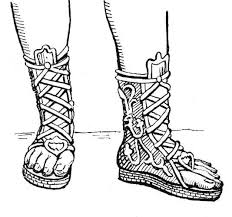buskin
英 ['bʌskɪn]
美 ['bʌskɪn]
- n. 半高统靴(尤指古希腊罗马悲剧演员的厚底靴);悲剧

记忆方法
为了记忆单词“buskin”,可以采用形象记忆法:
想象一位表演者在舞台上穿着短小的、类似小丑裙的服饰,这个服饰就像是小脚裙一样。将“buskin”与这个形象联系起来,记住“bus”代表“小”,而“skin”在结尾暗示“皮肤”或“覆盖物”。因此,“buskin”可以想象成覆盖在小腿上的短裙,这样的视觉形象有助于记忆。
想象一位表演者在舞台上穿着短小的、类似小丑裙的服饰,这个服饰就像是小脚裙一样。将“buskin”与这个形象联系起来,记住“bus”代表“小”,而“skin”在结尾暗示“皮肤”或“覆盖物”。因此,“buskin”可以想象成覆盖在小腿上的短裙,这样的视觉形象有助于记忆。
以上内容由AI生成, 仅供参考和借鉴
英语词源
- buskin (n.)
- "half boot," c. 1500, origin unknown. The word exists in different forms in most of the continental languages, and the exact relationship of them all apparently has yet to be determined. The English word is perhaps immediately from Old French broissequin "buskin; a kind of cloth" (14c., Modern French brodequin by influence of broder "to embroider"), or from Middle Dutch brosekin "small leather boot," which is of uncertain origin. OED suggests a likely candidate in Spanish borcegui, earlier boszegui
Figurative senses in English relating to tragedy are from the word being used (since mid-16c.) to translate Greek kothurnus, the high, thick-soled boot worn in Athenian tragedy; contrasted with sock, the low shoe worn by comedians. Related: Buskined.